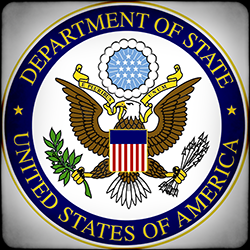Two foreign service officers (FSO) in opposite corners of the world recently have been implicated in cash-for-visa scandals that have raised new questions about the State Department's lack of oversight in the visa issuance process. In May, Michael Sestak, an FSO who was serving as the non-immigrant visa (NIV) chief at the U.S. Consulate in Ho Chi Minh City, Vietnam, was arrested in California and has been charged with conspiracy to commit visa fraud and bribery. And in early July, the State Department removed an FSO, Edy Zohar Rodrigues Duran, from his post in Georgetown, Guyana, over still-pending allegations that he was selling visas for sex and money.

As a former FSO who was involved in visa work at embassies in Macedonia, Trinidad, and Hungary, I can attest to the fact that cases like these are rare; 99.9 percent of FSOs are honest, but unfortunately the State Department's lax culture of issuance and travel facilitation allows the one-tenth of 1 percent who might consider selling visas wide latitude to operate. One could argue that because these two were caught proves the system works, but I think it offers too much space and latitude for dishonest people to tempt fate.
According to the criminal complaint against Sestak, who arrived in Ho Chi Minh City in August 2010, his NIV refusal rate was, at times, as low as 3 to 8 percent in a country where the overall refusal rate was 22 percent in 2012, 34 percent in 2011, 36 percent in 2010, and 42 percent in 2009. (You can see from that trend line how Sestak moved the needle a full 20 points during his ignominious tenure there.) The problem is that issuing visas to nearly everyone doesn't necessarily raise alarm bells at many posts because you also have some honest FSOs who refuse virtually no one.
Worldwide, issuance rates for visitor's visas are typically about 75 percent and often even higher in the countries that send us the most immigrants. In 2012, the issuance rate was 90 percent in Mexico, 92 percent in China, and 97 percent in Brazil. Even in poor countries like Bangladesh (74 percent), Nigeria (66 percent), Guyana (54 percent) and Nicaragua (73 percent) most NIV applicants got their visas. With these kinds of issuance rates, there are plenty of unqualified applicants walking away with visas, so those who paid a bribe for theirs stand out less.
As I wrote in the CIS Backgrounder "No Coyote Needed", when I was a consular officer I had to constantly justify why I had refused visa applicants, but no one ever asked me why I granted visas. Section 214 (b) of the Immigration and Nationality Act puts the onus on visitor's visa applicants to prove that they have strong ties to their home country that will compel them to return. The law says that applicants are guilty until proven innocent. But in reality, it tends to be the other way around. Applicants are given the benefit of the doubt.
Hopefully these incidents will serve to scare the hell out of any FSO who might consider going rogue, but unfortunately the negative press will also reinforce the notion that the U.S. visa process is corrupt. Even though 99.9 percent of FSOs are honest, there is a perception in many places that you have to have a connection to get a visa, and these incidents will only strengthen that notion.
Consular managers at posts around the world need to take a much closer look at visitor visa issuances, not just the denials. FSOs should be prepared to justify why they issued visas to applicants who look unqualified based on their written applications, because in a culture where issuance is the norm with no questions asked, dishonest people have an opportunity to make a killing. And there are no guarantees that the next crook will be caught.
